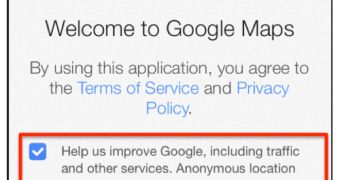Google Maps is regarded as the best maps service around, the most accurate, the fastest and so on. To maintain this level of accuracy, Google uses many sources of data, from governments and private companies to the users themselves.
One of the ways Google is able to offer live traffic conditions for example is to keep an eye on the movements of Google Maps mobile users.
Google doesn't do this without the user's knowledge, of course.
But as long as users agree to have their location anonymously collected and keep a data connection and the GPS on, their movements can help Google determine whether there's a traffic jam or whether cars are moving freely.
The new iPhone Google Maps app does this too, just like the Android one. But one small detail of how Google handles the feature could be put in violation of European privacy laws, Germany's in particular, which are some of the strictest in the world.
In the new Maps app, the box next to the text describing the feature is checked by default. Unless users specifically uncheck it, they will be opted into the service automatically.
According to the European laws, any collection of private data must be done with explicit consent and users need to be able to opt in, not opt out.
It remains to be seen whether this will escalate into anything serious for Google, though the company has had plenty of animosities with European privacy watchdogs, particularly in Germany.
The Street View Wi-Fi fiasco, in which Street View cars collected payload data from public networks, is not yet entirely behind Google. Changes to its data retention policies, i.e. privacy policies, earlier this year also got plenty of criticism, even though virtually every other Internet company does the same. Google doesn't need any more attention drawn to it over issues like this.

 14 DAY TRIAL //
14 DAY TRIAL //